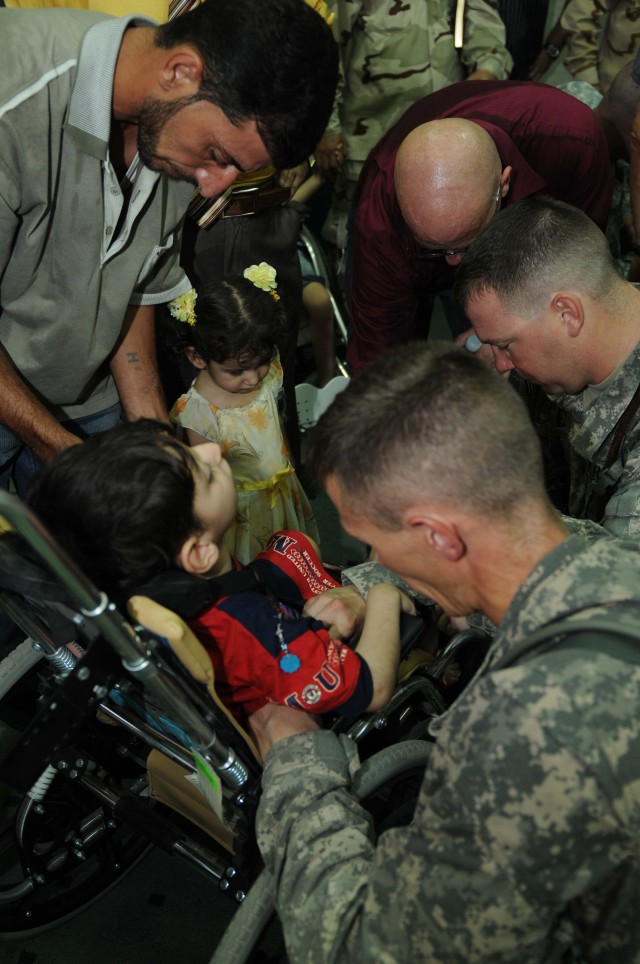BAGHDAD (Army News Service, Aug. 24, 2010) -- Some previously immobile children in Iraq are getting a taste of independence now thanks to generous donors and a time commitment by some within United States Division-Center.
"So much of what the Army is geared toward is targeting or improving the perception of or reinforcing the government of Iraq to their people," said Lt. Col. Vincent Barnhart. "But for a few hours, on behalf of the American people, we blessed the lives of the Iraqi kids."
Barnhart, a surgeon with 1st Armored Division, and those in his section, have participated three times in delivering wheelchairs to children of Iraq. The wheelchairs come from the non-profit organization "Wheelchairs for Iraqi Kids," founded by Dallas-native Brad Blauser.
"USD-C saw an opportunity where they could help," said Blauser. "USD-C stepped in and assisted in running the wheelchair (distribution) event. After the first effort with USD-C, more volunteers came to the next event, held at the Liberty Field House on Camp Liberty, (Iraq)."
Barnhart said the leadership of the 1st AD sees the wheelchair program as an opportunity to do great things for the Iraqi population. It is also an opportunity to rebuild the trust between the Iraqi Security Forces and the Iraqi people.
"(The 1st AD) can help reinforce the Iraqi Police and the Iraqi Army's standing with their citizens through the wheelchair events, as they take the lead on this outreach program," he said. "The Iraqi children all come carried in. And they leave with mobility options. They go home in the wheelchairs they need, and we are able to influence these areas positively by building rapport between the IP, the IA and their local communities."
Barnhart's section has adopted the wheelchair charity as one of their main outreach efforts. His staff members are trained by Blauser on how to properly assemble and fit the wheelchairs to the needs of the children.
Most Iraqi parents do not have access to the specialty care they want for their children, Barnhart said. They do not have the capacity to get quality medical wheelchairs like the ones Wheelchairs for Iraqi Kids delivers.
"The greatest rewards are the kids," Barnhart said. "The kids are the hope and the future of Iraq. Not just in the standard way kids are always going to be the future, but if we can influence these children positively, they will be the generation (whose) ideals change (life) for the better."
The future of the wheelchair program is bright. There is a nearly finished factory, where Army units can use their Commanders' Emergency Relief Program funds to buy wheelchairs directly from the factory instead of having them shipped from the U.S.
Blauser said he has made himself available as the subject matter expert on fitting the wheelchairs to the specific needs of the children who receive them.
"I can train the troops on how the wheelchairs work and how to adjust them," he said. "I can go down to the Ministry of Health and rehabilitation centers and teach those people how to adjust wheelchairs, too."
Blauser said he hopes the Iraqi Ministry of Health will join in on the charity effort and buy wheelchairs for the estimated 2.25 million Iraqi children who still need wheelchairs.
"It is great to have USD-C involved and supporting so directly," Blauser said. "Now they're wrapped around me and are trying to support me in every way possible."
According to the organization's website, 834 wheelchairs, retail valued at $2.5 million, have been distributed since the program began in August 2005.




Social Sharing